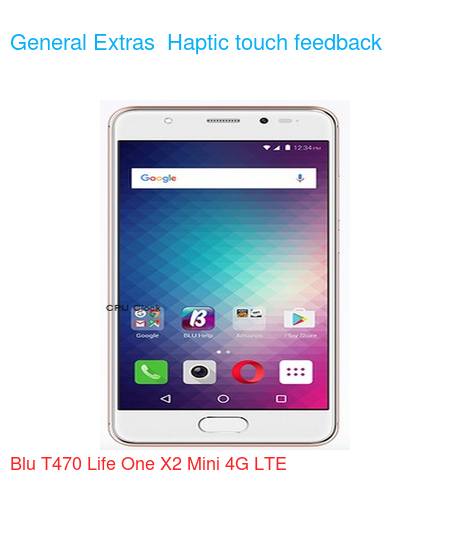| Brand | Blu |
| Model | T470 Life One X2 Mini 4G LTE |
| Released | 2017 Mar |
| General Extras | Haptic touch feedback |
| Device Category | Smartphone |
| Width | 69.6 mm |
| Height | 142 mm |
| Depth | 8.7 mm |
| Dimensions | 2.74×5.59×0.34 inches |
| Mass | 152 g |
| Platform | Android |
| Operating System | Google Android 6.0.1 (Marshmallow) |
| CPU Clock | 1400 MHz |
| CPU | Qualcomm Snapdragon 430 MSM8937, 2016, 64 bit, octa-core, 512 Kbyte L2, 28 nm, Qualcomm Adreno 505 GPU |
| RAM Type | LPDDR3 SDRAM |
| RAM Capacity (converted) | 4 GiB RAM |
| Non-volatile Memory Interface | eMMC 5.1 |
| Non-volatile Memory Capacity (converted) | 64 GB ROM |
| Display Diagonal | 127 mm |
| Resolution | 1080×1920 |
| Horizontal Full Bezel Width | 7.34 mm |
| Display Area Utilization | 69.7% |
| Pixel Density | 441 PPI |
| Display Type | Color IPS TFT LCD display |
| Number of Display Scales | 16.8M |
| Scratch Resistant Screen | Gorilla Glass 3 |
| Graphical Controller | Qualcomm Adreno 505 |
| Dedicated Graphics Memory | 0.125 MiB |
| A/V Out | No |
| Microphone(s) | mono |
| Loudspeaker(s): | mono |
| Audio Output: | 3.5mm |
| Supported Cellular Bands | GSM850 , GSM900 , GSM1800 , GSM1900 , UMTS2100 (B1) , UMTS1900 (B2) , UMTS1700/2100 (B4) , UMTS850 (B5) , LTE1900 (B2) , LTE1700/2100 (B4) , LTE2600 (B7) , LTE700 (B12) , LTE700 (B17) bands |
| Supported Cellular Data Links | GPRS , EDGE , UMTS , HSUPA , HSUPA 5.8 , HSDPA , HSDPA 7.2 , HSPA+ 21.1 , HSPA+ 42.2 , LTE , LTE 100/50 , LTE 150/50 data links |
| SIM Card Slot | Yes |
| Complementary Phone Services | Voice transmission , Voice speaker , Vibrate , Speakerphone |
| Sec. Supported Cellular Networks: | No |
| Touchscreen Type | Capacitive multi-touch screen |
| Expansion Interfaces | TransFlash , microSD , microSDHC , microSDXC |
| USB | USB 2.0 |
| USB Services | USB charging , USB fast charging |
| USB Connector | USB Micro-B (Micro-USB) |
| Bluetooth | Bluetooth 4.0 |
| Wireless LAN | 802.11b , 802.11g , 802.11n |
| Wireless Services | Wi-Fi Direct , Wi-Fi Tethering |
| FM Radio Receiver | FM radio (76-108 MHz) |
| Complementary Satellite Services | Simultaneous GPS , A-GPS , Geotagging , QuickGPS |
| Supported GLONASS protocol(s) | L1OF |
| Camera Placement | Rear |
| Camera Image Sensor | CMOS |
| Number of effective pixels | 12.8 MP camera |
| Aperture (W) | f/2.20 |
| Zoom | 1.0 x optical zoom |
| Focus | PD AF |
| Video Recording | 1920×1080 pixel |
| Flash | single LED |
| Camera Extra Functions | HDR photo , Macro mode , Panorama Photo , Face detection , Face tagging , Smile detection , Face retouch |
| Aux. Camera Image Sensor | No |
| Aux. 2 Camera Image Sensor | No |
| Aux. 3 Camera Image Sensor | No |
| Aux. 4 Camera Image Sensor | No |
| Secondary Camera Placement | Front |
| Secondary Camera Sensor | CMOS |
| Secondary Camera Number of pixels | 8.0 MP sec. cam |
| Secondary Video Recording | 1280×720 pixel |
| Sec. Built-in Flash | single LED |
| Sec. Aux. Cam. Image Sensor | No |
| Built-in compass | Yes |
| Built-in accelerometer | Yes |
| Built-in gyroscope | Yes |
| Additional sensors | FP sensor , L sensor , P sensor |
| Protection from solid materials | Yes |
| Protection from liquids | Yes |
| Battery | Li-ion polymer (LiPo) |
| Nominal Battery Capacity | 3000 mAh battery |
| Market Countries | USA |
| Market Regions | Central America , Eastern Europe , North America , South America |
| Added | 2024-06-22 |
Specifications data description of this 📱Blu T470 Life One X2 Mini 4G LTE📱
Title: The Ultimate Specification Guide for Your Next Device 🌐📱
Introduction
————
In today’s fast-paced world, staying ahead of technology is essential. Whether you’re an avid gamer, a busy professional, or a social butterfly, choosing the right device that caters to your unique needs can significantly impact your daily life. In this blog post, we’ll explore the key specifications to consider when selecting your next smartphone, tablet, or 2-in-1 device. Prepare yourself for an exciting rundown, covering everything from the network and launch date to its powerful features and impressive battery life. 🌐LAUNCH📅🔥
Lineup 📊
———
With a wide variety of devices in the market, we understand that choosing the perfect one could be challenging. Let’s first look at the different price ranges and corresponding features to help narrow your preferences.
### Budget-friendly devices (under $300)
These entry-level devices provide essential features, perfect for users looking for a reliable communication and entertainment device. Expect a solid build and performance for basic-to-intermediate functionalities, such as browsing, texting, and light gaming.
### Mid-range devices ($300-$600)
As you move up the price range, you’ll experience improved performance, a better display, a more refined design, and additional features. These devices cater to users who require more advanced multitasking capabilities and a smoother multimedia experience.
### Premium devices ($600 and up)
Ready to indulge?! High-end devices offer the most cutting-edge features with no expense spared. The latest and fastest processors, stunning displays, incredible cameras, and unparalleled design – these devices can truly do it all.
Design 🏋️
——–
Design is an essential part of choosing the right device, impacting both aesthetics and usability. Below are the primary factors to contemplate:
* Size and weight: Striking a balance between portability and screen real estate contributes to a positive user experience.
* Build quality: Durability is vital; a solidly-built device eliminates the fear of damage from accidental drops.
* Display: An immersive, high-resolution display complements visual experiences, including gorgeous visuals, videos, and browsing the web.
* Ergonomics: Ensure the device is comfortable to hold, and the buttons are placed intuitively for easy access.
Specifications 📈
————–
Now let’s dive into the nitty-gritty of the device specifications:
### 🌐 Network:
– 4G/5G connectivity
– Wi-Fi a/b/g/n/ac/ax
– Bluetooth 5.x
– NFC support
### 📅 LAUNCH:
– Release date
– Android/iOS version at launch and future update schedule
### 🏋️ BODY:
– Size (height x width x thickness)
– Weight
– Material (glass, metal, or plastic)
– Display type (LCD, OLED, AMOLED) and size
– Resolution and aspect ratio
### 🌈 DISPLAY:
– Brightness (nits)
– Contrast ratio
– Color space (sRGB, DCI-P3)
– Color accuracy
– Refresh rate (Hz)
### 🤖 OS 🛠️:
– Android version, customizations, and security updates
– iOS version and future updates
### 🚀 Chipset 🔧:
– Model name (Snapdragon, MediaTek, Kirin, or Exynos)
– Cores (CPU & GPU) and clock speed
– Fabrication process (nm)
– AI capabilities and performance
### 💪 CPU 🖥️:
– Clock speed (GHz) and architecture
– Number of cores
– Power efficiency
– Performance score (AnTuTu, Geekbench)
### 🎮 GPU 💻:
– Model name (Adreno, Mali, or PowerVR)
– Clock speed
– Graphics performance score (GFXBench, 3DMark)
– Vulkan or Metal API support
### 🧠 MEMORY 🗂️:
– RAM (GB)
– Storage (GB/TB)
– Expandable storage (microSD, UFS)
### 📷 CAMERA 🎥:
– Back camera: Sensor size, lens aperture, OIS, EIS, zoom
– Front camera: Sensor size, lens aperture
– Video recording (4K, 1080p)
### 🔈 SOUND 🎵:
– 3.5mm headphone jack or USB-C
– Quad DAC, Hi-Res Audio
– Stereo speakers
### 📡 COMMS 📶:
– Cellular bands (2G, 3G, 4G, 5G)
– Wi-Fi a/b/g/n/ac/ax
– Bluetooth 5.x
– GPS / GLONASS / Galileo / BeiDou
– NFC support
### 💡 FEATURES 🎁:
– Biometric security (fingerprint, face)
– Water and dust resistance (IP67, IP68)
– Fast charging (QC, PD)
– Battery capacity (mAh)
– Reverse wireless charging
### 🔋 BATTERY🔌 :
– Battery capacity (mAh)
– Fast charging (QC, PD)
– Wireless charging support
– Reverse wireless charging
Conclusion 🎬
———-
In conclusion, selecting a device with the right mix of specifications and features is crucial to enhance your daily computing experience. Taking the time to explore various price ranges, design aspects, and key specifications will ensure you make the most informed decision, providing the best value.
Now that you have a better understanding of the various factors that contribute to finding the best device, it’s time for you, the reader, to consider the information discussed and leave a comment on which device you’re currently using or considering – and why.
Take care, stay curious, and keep on learning! 😊💻🌎














